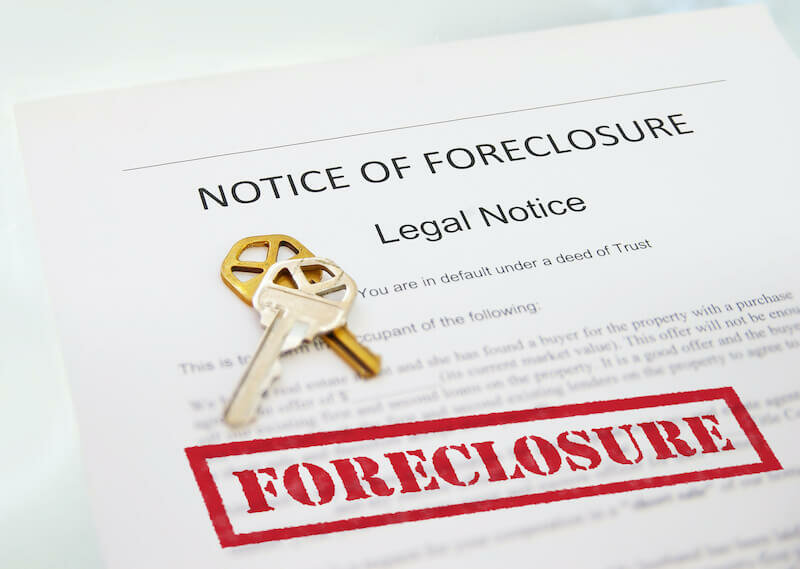It can be a scary feeling when you start getting those past-due notifications in the mail and voicemails from your mortgage company. You may feel stuck, not knowing what your next steps should be or how to get out of this situation. But before you get too overwhelmed, you have options before it’s too late to stop a foreclosure in Utah. We’ll cover all you need to know about Utah’s foreclosure process and what you can do to avoid foreclosure before it’s too late.
Foreclosure And How To Stop It

Foreclosure in Utah
The first thing to understand is that foreclosure in Utah is a process. Before you start thinking about the worst-case scenarios in your head, you do have some time to work things out with your mortgage lender. Suppose you were late making a mortgage payment, that doesn’t instantly start the foreclosure process. The lender usually gives you a grace period of ten to fifteen days before you begin accruing late charges. If you’re unsure what your grace period is, look at the promissory note or your monthly billing statement to find out the time frame and the cost of the late fees.
In cases where you miss a few mortgage payments, the mortgage company will more than likely send you letters and call you to try to collect. Generally, in most situations like this, federal mortgage servicing laws require the lender to contact you (or attempt to contact you) via phone to discuss foreclosure alternatives—called “loss mitigation” options. These options are presented no later than 36 days after a missed payment and again within 36 days after each following missed payment. Also, within 45 days after a missed payment, the loan provider must contact you in writing about loss mitigation options that could be available to you and assign you personnel help.
Ultimately, your lender will try to assist you in saving your house; it is not their intention to kick you out as soon as you miss a payment.
Foreclosure Laws
Federal law requires the servicer to officially begin foreclosure until you’re more than 120 days past due on payments, but it is subject to a few exceptions. During these 120 days, homeowners are provided with ample opportunity to submit a loss mitigation application to the servicer.
The method by which foreclosure laws in Utah are handled is usually non-judicially, although judicial foreclosures are also allowed. Utah law specifies how non-judicial procedures work, and both federal and state laws give you rights and protections throughout the foreclosure process. To clarify, judicial foreclosures are handled by the court, and the lender must file a lawsuit to foreclose on the property. In non-judicial foreclosures, the courts have minimal if any involvement and are typically handled entirely out of court by a trustee, which the lender designates in the deed of trust that the borrower signs when buying the home.
Thankfully most of the foreclosure laws give protection to borrowers. A lender generally has to provide the borrower with loss mitigation opportunities, account for each foreclosure step, and strictly comply with Utah foreclosure laws. Furthermore, most people who take out a loan to purchase a residential property in Utah sign a deed of trust and promissory note, which is like a mortgage. These documents give borrowers some contractual rights, as well as federal and state legal protections.
In a Utah foreclosure, you will most likely get the right to:
- a pre-foreclosure notice
- apply for loss mitigation
- receive certain foreclosure notifications
- get current on the loan and stop the home foreclosure sale
- receive special protections if you’re in the military
- pay off the loan to prevent a sale
- file for bankruptcy, and
- get any excess money after a foreclosure sale
Foreclosure Process
Before the servicer or lender can officially start the foreclosure, it has to mail you (the borrower) a notice of default or a notice of intent to file. This pre-foreclosure notice must contain, among other things, information about:
- Who to contact to find out about loan modification or other foreclosure relief and
- 30 days to pay off the amount due to cure the default -catch up on payments- and avoid the notice of default being filed.
To officially start the foreclosure process, the lender must record a notice of default with the county clerk’s office at least three months before giving a notice of sale. The lender mails a copy of the notice of default within ten days after recording it to anyone who requested a copy. Most deeds of trust in Utah usually include a request for notice, so the borrower (homeowner) typically gets this notification.
After that, the lender mails a copy of the notice of sale to you (the borrower) at least 20 days before the sale, that is, if the deed of trust includes a request for notice. Typically most Utah deeds of trust have a request for notice provisions. The lender is also to
- Publish the notice in the newspaper and
- Post the notice on the property at least 20 days before the sale
You have the right to reinstate the loan, which is where the borrower pays the overdue amount, plus fees and costs, to bring the loan current. This can stop the foreclosure process but must be done within three months of the trustee recording the notice of default. The deed of trust may grant you more time to complete a reinstatement. Check your paperwork you signed when you took out the loan to determine if you get more time to bring the loan current. You can also call your loan provider and ask if the lender will let you reinstate the loan.
→ Can you stay in a house after foreclosure in Utah? Find out by clicking here!
What is Pre-foreclosure?
Pre-foreclosure is the period of time between the initial late payment up until the official foreclosure sale. Between that time, if you’re able to work something out with your lender, you can stop the pre-foreclosure process. But keep in mind, during this time, the lender can charge you various fees, like late charges and inspection fees. In most cases, you must be informed of the ways you can avoid foreclosure and should get a pre-foreclosure notice called a “breach letter.”

Avoiding Foreclosure in Utah
You do have a few options when it comes to avoiding foreclosure in Utah. Ideally, the best-case scenario would be to work something out with your mortgage company and keep your house. A few solutions your lender may suggest would include:
- Loan Forbearance
Loan Forbearance reduces or temporarily defer loan payments for a period of time while interest continues to accrue, adding to the total unpaid balance during the forbearance period.
- Loan Modification
A modification would amend or modify one or more terms of the home loan, which could include the total unpaid balance, interest rate, maturity date, or interest type. Most lenders attempt a trial modification before executing a formal loan modification.
- Deed in Lieu of Foreclosure
A deed in lieu or DIL transfers ownership from the property owner to the mortgage company. In exchange, the servicer clears the mortgage loan and waives the remaining balance due. Sometimes this is called “cash for keys,” and the property owner may be compensated for relocation costs in exchange for the deed.
- Short Sale
The residence is sold for less than the balance owed on the mortgage for an amount designated or approved by the lender.
When deciding what to do next, you’ll need to keep in mind that some of these options involve making drastic changes to your financial situation. Other scenarios include transferring ownership or selling for an amount approved by the lender. Some people prefer to do things on their own terms and find selling the house the best solution.
But you may be asking “can I sell my house in foreclosure”, and the answer is yes you can but you’ll need to do so quickly and find the right buyer to sell your home to.
Another Way to Avoid Foreclosure: Sell As-Is
Selling a house in Utah can be unpredictable and require repairs before listing. Since you’re kinda on a deadline to either become current on your mortgage or get foreclosed on, you’ll be saying, “I need to sell my house fast.” So finding the right buyer that can close quickly and buy your house as-is will be necessary.
The good news is CashQuickBuyers is a perfect buyer for this particular situation. They are a local home buying company that purchases homes in as-is condition and can close within 7-14 days. Cash Quick Buyers buy houses with cash instead of bank financing, which doesn’t obligate them to contingencies and waiting on loan approval.
Selling your property as-is is also extremely helpful because repairs can be costly and time-consuming to complete depending on the scope of work needed.
Furthermore, when you sell to Cash Quick Buyers, there are no realtor commissions or fees, and they will even help pay closing costs. Ultimately, this would save you thousands of dollars and months of uncertainty if you were to sell your Utah home to Cash Quick Buyers.
When is it Too Late to Stop Foreclosure?
When it comes to foreclosure, you do need to be proactive with whatever you decide to do. If you’re going to work something out with your mortgage company, make sure you let them know right away. If you’re going to list your home and try to sell, make sure you let them know your plans. Communicating what you plan to do to pay them back or become current on your payments is a good idea. Not responding is not a solution. You should be able to work something out up until the day of the foreclosure sale; after that, it will be too late to stop foreclosure.
Final Thoughts:
Whatever you do, try to avoid foreclosure at all costs. Having a foreclosure on your credit history isn’t good and will stay on your report for seven years. And although you may be able to keep your house if you were to file for bankruptcy, that will also stay on your credit history for several years as well.
When deciding what to do next, remember that working out payments with your bank or deferring payments may not be a solution either. Some people find it difficult to budget or change their spending habits that got them in this situation in the first place.
If you were to take the Deed in Lieu of Foreclosure or Short Sale route, any equity you put into the home could potentially be lost.
Ideally, the best solution would be to sell your house as-is and use the profits towards purchasing an affordable home. Doing so would put you in a better financial position and prevent you from going into foreclosure in Utah.
If you’re in pre-foreclosure in Utah and would like to sell your house fast, contact Cash Quick Buyers today for a free cash offer. They provide an easy home buying process for homeowners facing unique selling situations like foreclosure and so much more.
For more information about our company or how to contact us, please visit our website. We look forward to working with you and finding a solution for your particular situation.
The material and information in this article are for general information purposes only. You should not rely upon the material or information within this article as a basis for making any business, legal or financial decisions. Be advised to seek the advice of a Utah attorney regarding your foreclosure situation if you have any questions or want to learn more about Utah foreclosure laws.

